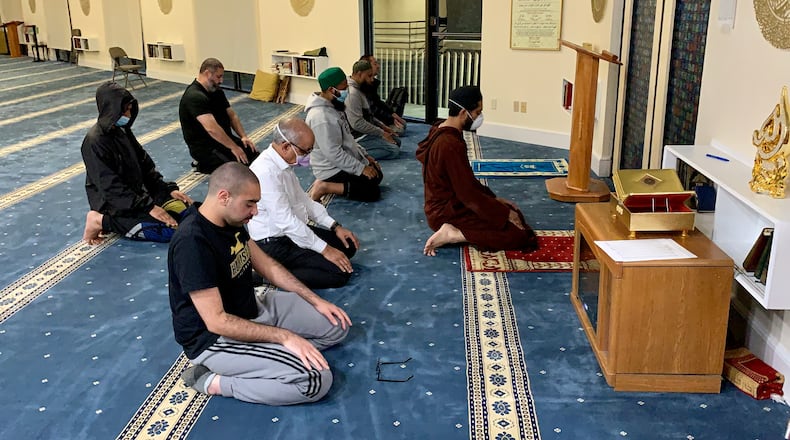Samina Ahmed, a member of the Springfield-based Miami Valley Islamic Association board, said she was shocked when she found out the attackers claimed to be Muslims.
“Because that’s against our faith to do anything like that,” she said. “They were Muslim by name, but they obviously didn’t know the faith. The faith would never tell them to do something as horrible as what they have done.”
Still, there was backlash. In 2001, hate crimes against Muslim Americans spiked. According to the FBI, there were 93 anti-Muslim assaults reported nationwide in 2001, compared to 12 in 2000. There were also 296 reported victims of anti-Muslim intimidation in the U.S. 2001.
The Council on American-Islamic Relations is a civil rights organization that advocates for Muslim American’s rights, including through education and legal help. Whitney Siddiqi, community affairs director for the CAIR Ohio chapter, said the need for its services defending Ohio Muslims increases every year. Last year, over 220 Muslim Ohioans contacted CAIR seeking help with some form of discrimination incident.
Yanes said classmates called his daughter a terrorist a few times in the years after 9/11.
“These things were common,” he said. “And most people don’t even report them.”
A few years ago, a long-time patient and friend of Yanes asked him what religion he is.
“I said, ‘I’m Muslim.’ And the first thing this distinguished guy in his 80s said was, ‘What? You hate us,’” Yanes said. “I didn’t know what to say to that … and this guy is an intelligent person, a respected person in the community.”
Yanes explained that anti-Muslim hate, or Islamophobia, has long been mixed with prejudice against immigrants and racism. Many Americans incorrectly believe all Muslims are Arab or Middle Eastern, Yanes said. There are approximately 1.9 billion Muslims worldwide, with the majority living in the Asia-Pacific region, according to World Population Review.
Many Americans also assume all Arabs are Muslim, Yanes said. The majority of Arab Americans are Christian, according to the Arab American Institute.
“Much of bigotry is due to ignorance,” Yanes said.“And in the last 20 years, if anything, things seem to be getting worse.”
A report from CAIR identified over 10,000 anti-Muslim bias incidents nationwide between 2014 and 2019 with a measurable spike in 2017 after the declaration of President Trump’s Muslim travel ban.
Amina Wase, a 17-year-old senior at Centerville High School who is Muslim and Indian American, said the portrayal of Muslims in media has not helped.
“Media in general just plays such a huge role in reinforcing negative stereotypes,” she said. “It’s just so easy to be caught into this cycle, where you’re constantly shown the exact same things and it just reinforces your ideas … Our representation in media is almost always negative.”
One study of the 100 top-grossing U.S. films from 2017-2019 found that only 1.1% of the characters were Muslim and a disproportionate number of those played violent roles.
Bridging the divide
Dr. Abdul Wase, Amina’s father, said people are less likely to be hateful if they get to know a Muslim person.
“Xenophobia or Islamophobia arises just because people do not know other people,” he said. “If you come to the mosque or if you meet Muslims and come to know each other one to one, then you really realize that they are the same people. They have the same goodness, they have the same bad people any community has.”
A 2019 survey by the Pew Research Forum found that of nine major religious groups, Muslims and atheists were viewed the least favorably by Americans. Religious groups, including Muslims, were viewed more favorably by people with a personal connection to somebody in the group.
Ahmed, of Springfield, has devoted much of her life in the past two decades to educating non-Muslims about Islam.
“It’s just the fear of the unknown … I have a lot of non-Muslim friends who told me after the attacks, ‘You need to speak up and you need to educate people. You need to let them know your faith is not like that,’” she said. “So then I started speaking out, going to colleges, going to churches, going to universities, wherever they would invite me, and tell them that my faith does not teach that at all and this is totally against the teaching of the Quran.”
She tries to dispel misconceptions and explain that Muslims worship one god; they believe in many of the same prophets as Christians and Jews like Jesus, Moses and Abraham, but they believe Prophet Muhammad is the last prophet; and Muslim women like herself are not oppressed or forced to cover their hair. She gives out English copies of the Quran, Islam’s central text which Muslims believe is the word of God, to anybody who wants one.
To show that Islam is a peaceful religion, Ahmed likes to point to a passage from the Quran that says, “whoever kills an innocent person it is as if he has killed all of humanity.”
About this series
The Dayton Daily News is examining the lasting toll of the Sept. 11, 2001, terrorist attacks and what it means to our community 20 years later.
Monday: A Xenia man born on Sept. 11, 2001, has now joined the Air Force and is in boot camp.
Tuesday: How Wright-Patterson Air Force Base responded; Remembering a Mason woman who died in the attacks.
Wednesday: The impact on the local Muslim community.
Thursday: A local ER doctor who responded to Ground Zero.
Friday: The attacks changed Wright-Patterson – and the Air Force – forever.
Saturday: Readers share their memories of 9/11.
About the Author



